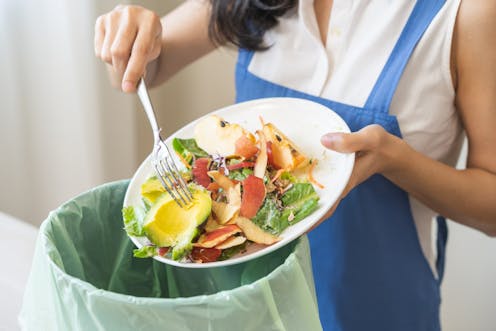
The EU and UK pledged to reduce food waste, in line with the UN’s goal to halve global food waste by 2030. With most (approximately 53%) of total food waste in European countries occurring in homes, this stage of the food chain presents the most significant challenge due to the need for widespread behaviour change.
Although consumer food waste is a complex issue influenced by factors such as people’s knowledge, habits, social norms and food supply chain efficiency, reducing household food waste is achievable.
Reduction of food waste can have multiple benefits, including conserving limited natural resources such as water, improving food security and reducing greenhouse gas emissions that contribute to climate change. My new research shows that reduction is possible with the right tools for behaviour change and consumer willingness to prevent food waste.
I was in a team of 15 researchers and practitioners with expertise in consumer food waste prevention, working with the European Consumer Food Waste Forum. We evaluated 78 interventions across the EU, UK and beyond.
A combination of different approaches is needed to significantly reduce consumer food waste – there’s no single thing that could change the way everyone deals with their food waste. Customised interventions to specific groups of consumers works best, especially when people are willing, engaged and actively involved in the process.
We identified which of the solutions resulted in the biggest reductions in consumer food waste and made recommendations to tackle the problem.
Here are five steps that can help reduce food waste in your household:
1. Find out the facts
Start by educating yourself and your family to raise your awareness and motivate you to make changes to your daily routine. Look online at environmental charity Wrap (the Waste and Resources Action Programme) for useful resources about the problem of food waste and its negative effects on our present and future.
Share this knowledge and experience with your family, including your children. Learn about the ways to prevent food waste at home, for example, how to store food to eat healthily with less waste and how to reuse leftovers.
2. Make small changes
Make simple adjustments to your routine at home. Try going shopping with a list to avoid buying food you don’t need and might not use, plan your meals to buy just the right amount of ingredients, check date labels on packaging to prioritise eating items that are closer to expiring and reuse leftovers to make sure every bit of edible food is consumed.
3. Get confident in the kitchen
Cook and eat at home more often to eat healthily and reduce food waste.
Sign up to a cooking class to develop your skills in a fun way. Learning to prepare food more efficiently or getting creative with leftovers will help you make the most of your ingredients and prevent waste.

4. Use visual reminders
Employ simple tools and prompts to remind you about sustainable switches that can be incorporated into daily life. Put a sticker on foods that are nearing expiration dates to use them first or take pictures of wasted food to put it on your fridge as a visual reminder of the negative impact of waste.
5. Mix it up
Combine various approaches to prevent food waste in a way that works best for you and keeps you on track. Follow online tips and advice from organisations such as Zero Waste Scotland and Hubbub, use food waste apps such as Kitche, Too Good To Go or Olio to share excess ingredients with neighbours.
You can also get involved with community programmes in your local area such as FareShare Yorkshire and Surplus2Purpose, an initiative that redistributes unwanted food stock to those who need it most.
By adopting some or all of these practices and encouraging others to do the same, you can contribute to a larger movement to reduce food waste and help promote healthier and more sustainable eating habits.
Gulbanu Kaptan was awarded research funding (with project partners WRAP and Zero Waste Scotland) from the UKRI ESRC for a project on reducing household food waste (2020-2022). She is a Co-investigator on a UKRI Strategic Priorities Fund project on ensuring food system resilience. Between 2021 and 2023, she worked as an expert member of the European Consumer Food Waste Forum.
This article was originally published on The Conversation. Read the original article.







